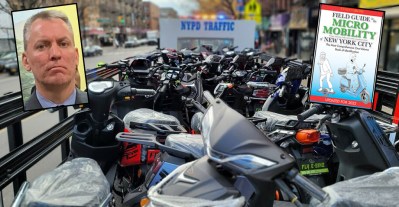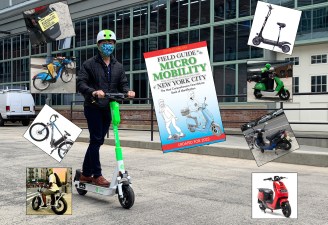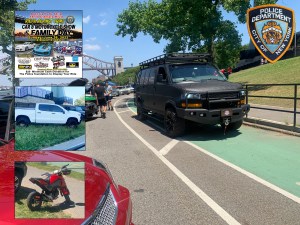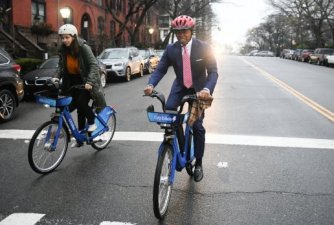NEW APPROACH: NYPD Cracking Down on Illegal Moped Sales Before they Happen
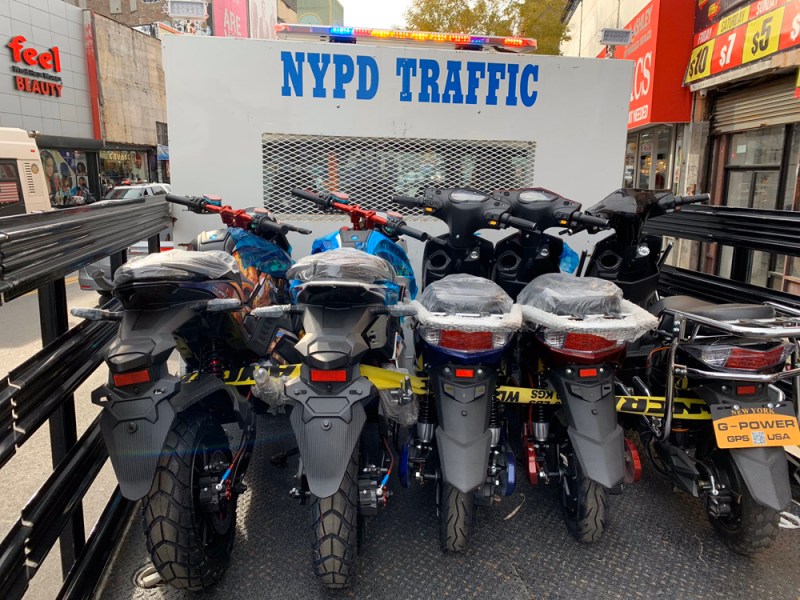

After years of seizing illegal mopeds and once-illegal e-bikes from delivery workers, the NYPD has embarked on a new strategy that has the backing of the city’s deliveristas: cops are now seizing mopeds at the stores where they are being sold in violation of city law.
According to the NYPD, police have seized 44 illegal mopeds during raids on five storefronts citing city administrative code 20-762, which forbids anyone to “sell, lease, or rent a motorized scooter” in the city without the required license plate. The exception, of course, is mopeds such as rentable Revel or Lime devices, or Vespas, which are registered with the state and bear a license plate.
“While the NYPD Transportation Bureau fully supports safe, sustainable modes of transportation, the bureau also recognizes that many quality of life and safety issues surround the use of these non-street legal devices,” NYPD spokesman Sgt. Edward Riley said in a statement to Streetsblog. “In order to properly address these concerns, enforcement has been taken against operators that are observed operating these illegal pedal-less devices that are failing to comply with license plate regulations. It also recognized that many legitimate business establishments are selling these non-street legal devices to customers under the guise that they are ‘e-bikes’ and that they are street legal. [The] law provides the NYPD with an enforcement mechanism prior to sale and operation.”

Cops don’t have to witness a sale, Riley added. “Offering these devices for sale is sufficient in order to constitute a violation of the law,” he said.
So far, the NYPD has tweeted two pictures of its operation, but it has not provided details until now. And the latest statement is the first time the agency has properly distinguished between legal e-bikes (i.e. electrified devices with pedals) and mopeds, many of which are illegal. Previously, the agency lumped together all electric, two-wheeled devices, which advocates said was an attempt to demonize all motorized bikes.
Indeed, the agency’s first tweet about its new operation in Upper Manhattan was filled with inaccuracies:
So far this year, E-bikes operators have been involved in 1,628 collisions, with 19 fatalities.
To address the use of illegal E-bikes, officers from the @NYPD25Pct & @NYPD30Pct, along with @NYPDTransport, conducted a business inspection and removed 31 illegal E-bikes & scooters. pic.twitter.com/VWkAyztGct
— NYPD NEWS (@NYPDnews) November 29, 2021
But a second one about an operation in The Bronx on Friday was more accurate:
Business inspections were conducted today and multiple confiscations were made by members of the Transportation Bureau and @NYPD40Pct to address the use of illegal motorized scooters in our city. Thank you @NYPDnews for your assistance. pic.twitter.com/eHwpG02WxZ
— Chief of Transportation (@NYPDTransport) December 10, 2021
Delivery workers and their union, Los Deliveristas Unidos, are supportive of the measure — one that delivery workers asked for from the NYPD at several meetings with top brass and some local precinct commanders:
“This is what we told the NYPD chief of transportation,” said Gustavo Ajche, a delivery worker and activist. “The most logical thing is to go where they buy them. That is where they do not [register the mopeds] and do not care what they sell. They only see money and do not think about street safety.”
About to meet with NYPD leadership along with food delivery workers and @workersjusticep to discuss safety for our essential workers. The time is now. pic.twitter.com/zpgv4EmzGf
— Alexa Avilés (@CMAlexaAviles) June 2, 2021
The NYPD said it is working with the Department of Transportation to determine locations where illegal mopeds are sold. Streetsblog has visited many such storefronts, very few of which are marked. They are often more like repair shops than retail locations, and salespeople frequently lie to would-be customers, telling potential buyers that the mopeds do not need to be registered, when, in fact, they do. One worker’s account was included in Streetsblog’s Field Guide to Micro Mobility [PDF], which was published earlier this year when NYPD and elected officials’ confusion about the many devices was running high.
“We are working closely with the NYPD and labor coalitions to ensure enforcement targets businesses for selling these illegal mopeds – and not delivery workers trying to make a living wage,” said DOT spokesman Vin Barron. “These mopeds are not e-bikes and it is against the law to sell them in New York.”
The DOT said it had provided cops with a list of the suspected illegal vendors, and is also hoping to educate delivery workers, who are frequently choosing faster mopeds so they can make a living in an industry known for exploitive working conditions, on what types of devices are legal.
The city Department of Consumer and Worker Protection, which regulates some city businesses, had told Streetsblog earlier this fall that it did not have oversight, even if retailers were violating city rules, deferring to the Department of Motor Vehicles. It is unclear what led to the NYPD and DOT initiating this enforcement effort.
Delivery workers said they “applaud” the new approach because stores “have lied and tricked hard-working people.”
“Los Deliveristas will cooperate with these agencies and ensure that stores and people are accountable for their actions,” said Hildalyn Colón Hernández, the group’s director of Policy & Strategic Partnerships. “New York City doesn’t need an unscrupulous business that takes advantage of law-abiding businesses, residents, deliveristas, and taxpayers.”
